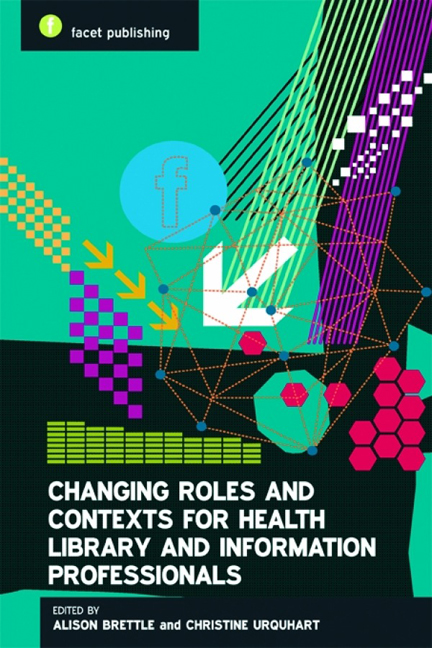Book contents
- Frontmatter
- Contents
- About the editors
- List of contributors
- Overview
- Part 1 Context
- Part 2 Roles
- 5 Skills, competencies and knowledge
- 6 The librarian as information provider and educator
- 7 The librarian who analyses information and manages knowledge
- 8 The librarian within research and evidence-based practice
- 9 The librarian as decision maker
- Conclusion
- Index
9 - The librarian as decision maker
from Part 2 - Roles
Published online by Cambridge University Press: 08 June 2018
- Frontmatter
- Contents
- About the editors
- List of contributors
- Overview
- Part 1 Context
- Part 2 Roles
- 5 Skills, competencies and knowledge
- 6 The librarian as information provider and educator
- 7 The librarian who analyses information and manages knowledge
- 8 The librarian within research and evidence-based practice
- 9 The librarian as decision maker
- Conclusion
- Index
Summary
Introduction
Managers of library and information services have always based their decisions on professional judgement, experience, and knowledge of their users’ and employers’ requirements. However, constant change makes the current situation different. A manager and leader of a health information service needs to be sensitive to their environment and comfortable with constant change. As health information professionals, we need to keep up to date with new technology and new ways of delivering information services. We also need to be aware of the external political situation and the impact that this will have on the information needs of our users. In addition, it is important to understand both the changing needs of the clients using our services, and the directors of our organizations. Management decisions need to be made in context, using our organizational knowledge (Cortada, 2009). It is crucial that the decisions that library managers make are relevant to the current needs of their employers and service users and that services are developed in line with changes. A professional judgement made out of context will not be the right one and will lead to the information service being irrelevant and superseded. If possible, library decision makers need to be anticipating changes in their organization, and to be ready with ideas and proposals. The need for decision making is becoming much more rapid, with quicker turnaround expected by employers.
Forward thinking
Health librarians need to scan the external environment, and also be aware of changes taking place within our own organizations. Our information management skills are a great strength. Library managers should be clear about their strategic direction, but strategy is likely to have to be more flexible than it used to be as external circumstances change. It is important to have a strategic framework, and to be clear of the direction of travel, for example from print to digital, from quiet to lively, from physical to outreach, and the steps that are needed to achieve this. Strategic goals should be underpinned by operational plans but we need to be aware of external developments, and changes in direction may be needed. Local strategies must be linked to our organizations’ overarching strategies. Good decision makers need to be alert to changes in thinking in their organizations.
- Type
- Chapter
- Information
- Publisher: FacetPrint publication year: 2011



